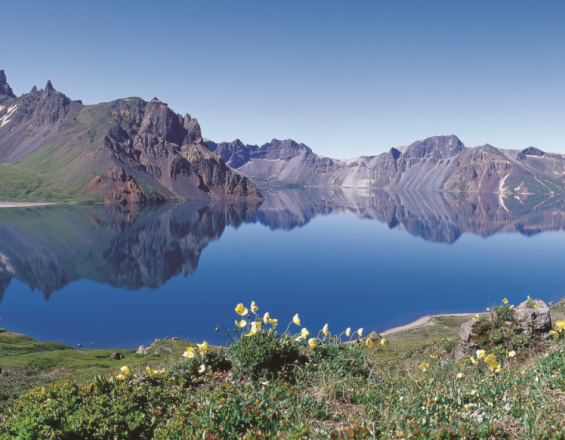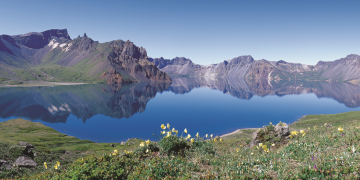Opening a space for PANORAMA Solutions Providers, to express their perceptions and perspectives on global issues. We aim at valuing their knowledge and know-how as well as collecting their recommendations and needs for upscaling and accelerating the impacts of their solution. We want to discuss about their vision for the future, and get their opinion on global decision-making processes.
Yan Xie, Chinese Academy of Sciences
Yan Xie is Associate Research Professor of the Institute of Zoology, Chinese Academy of Sciences and consultant on conservation technical issues at the Changbai Mountain National Nature Reserve, and for the development of the International Alliance of Protected Areas.
In conversation with Cécile Fattebert, IUCN Protected and Conserved Areas.
What makes your solution successful, in a nutshell?
Changbai mountain has a very beautiful lake on top of the mountain. It has the richest biodiversity of the area above 40° longitude, and diverse habitats, beautiful sceneries. It is very attractive for tourists especially from China and Korea. Before Covd-19, every year, there were more than 2 million visitors. We had to adopt some measures to mitigate bad impacts of tourism: we separated visitors’ area from the nature reserve, opened new areas outside, close to the nature reserve, from where tourists can still see the scenery. A very well-designed town was built to accommodate tourists, with green transportation (with facilities like renting a bike for cheap). A strong conservation team was built in the Centre, which is a department of the local government. It has the highest number of managers, over 700 managers in the nature reserve, purely working on conservation. Their work focuses a lot on fire control, which has successfully reduced wild fires in the Nature Reserve. They also control human activities, such as the unsustainable collection of Korean pine nuts, of which animals feed on, and the collection and sale of frogs. A lot of work has also been done on ecosystems restoration, that were degraded in the last strong wind episodes.
These issues are found in many areas in the North of China, but Changbai Mountain Nature Reserve succeeded in overcoming them thanks to the major income from tourism and the creation of a better environment for tourists. The Conservation Centre is very strong because it has a good financial support, but also because its leaders take conservation seriously and use the money well. Changbai Mountain government contributes a lot to international cooperation, became a MAB reserve in early 1979 and hosts Changbai Mountain International Eco-Forum every two years since 2013.
What is your vision for Changbai Mountain National Nature Reserve?
The Nature Reserve to be preserved, needs more systematic biological and species monitoring. Monitoring results would provide information to better understand the ecosystem, and identify impacts from Climate Change.
We should work more around the Nature Reserve, where human activities take place, and understand how these activities are impacting the environment.
On December 11, it was the International Mountain Day. The theme was sustainable mountain tourism, in light of the Covid-19 crisis as an “(…) opportunity to rethink mountain tourism and its impact on natural resources and livelihoods (…)”. When we read your PANORAMA solution, it seems that you have thought through and acted for the harmonious coexistence between man and nature, way before the pandemic. But would you say that the crisis has triggered new opportunities or had some positive impacts, to even do better? If yes, how?
Covid-19 reduced a lot the visitors’ number, and therefore the income of the government and the local people living in surrounding areas. Covid-19 did not increase the pressure on Nature Reserve, e.g. illegal activities did not increase. The Conservation Centre actually strengthened the conservation in the Nature Reserve: two new conservation stations were added, more patrolling and law enforcement were conducted. China is a specific case, in the sense that conservation is not highly dependent on tourism income, as there is a stable income provided by the local government for conservation work.
Based on your experience of challenges and successes, what message, recommendation or need, would you like to express to the international community, in terms of sustainable tourism development in mountain PCAs?
Conservation of ecosystems are key to human beings, so funding for conservation needs to come from government and other sources. Tourism cannot be the only or major funding for conservation, because it won’t be stable. Besides, in some places, tourism is not so high. Conservation still needs to be provided by government mainly and in addition by donors. Sometimes tourism income is high, some funding should be put aside and support conservation elsewhere, like an insurance.
Ecotourism should be better promoted through high quality services and information available for Chinese visitors, to attract more tourists from China and other developed countries. This would support African countries and other developing countries’ Protected Areas. Some transboundary areas, like tiger areas of Russia or Mongolia and other places more in the South should improve their communication with neighbouring countries, such as China, to bring new opportunities and develop tourism, attract Chinese visitors in their Protected Areas. This would entail for example to promote transboundary areas visitations by reducing visas constraints for foreign people to come. It would help increase income in those countries.
This article was originally published in IUCN Protecting the Planet Newsletter In January 2022

